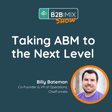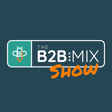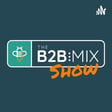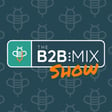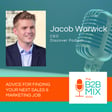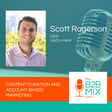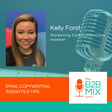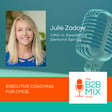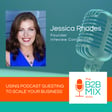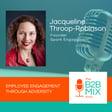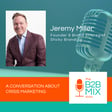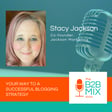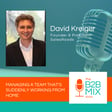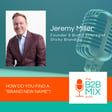Become a Creator today!Start creating today - Share your story with the world!
Start for free
00:00:00
00:00:01

Improving Your LinkedIn Game in 2022
On this episode of The B2B Mix Show, Stacy and Alanna talk with Vedran Rasic, Founder & CEO of LeadDelta, about ways people can improve their LinkedIn game in 2022.
Ved (that's what we call him 🙂) shares:
- Some background on LeadDelta
- How LeadDelta is different than a premium LinkedIn subscription
- Tips on messaging for LinkedIn from the eBook, 50 Proven LinkedIn Messages To Use In 2022
Want to connect with Ved? Look for Ved on LinkedIn.
---
About The B2B Mix Show
The B2B Mix Show with Alanna Jackson and Stacy Jackson is brought to you by The B2B Mix agency. Need help with your B2B online presence? Let's talk!
Connect with us on social media:
The B2B Mix Show — Twitter, Instagram, LinkedIn, Facebook
Transcript
Introduction to the B2B Mix Show
00:00:00
Speaker
Welcome to the B2B mix show with Elena and Stacey. In each episode, we'll bring you ideas that you can implement in your sales and marketing strategy. We'll share what we know, along with advice from industry experts who will join us on the show. Are you ready to mix it up? Let's get started. Hello, everyone. Welcome to the B2B mix show. Elena, you know what we're going to talk about this week?
LinkedIn Messaging Strategies
00:00:28
Speaker
I do.
00:00:32
Speaker
We're talking about LinkedIn messaging and the right approach to that because I think a lot of people are either afraid at times on what they're going to say, so they either don't say anything or they just keep it very basic.
00:00:48
Speaker
And it comes down to how you're sending your connection requests, how you're commenting and engaging with other people and what you need to do in order to get engagement back instead of making people say, oh, I don't want to talk to you. I'm going to put up a wall or I'm going to delete. I'm going to connect to you because you just pitched me right when you right after we connected. Yeah, that's my favorite thing to do is disconnect.
00:01:20
Speaker
to disconnect after people go in from the kill on that very first ask. They've gotten to the point where they don't do it right away. And they wait a little bit and it's like, come on. No, I know I'm not. I still get rid of them if they do that. Yeah, I do too. And no offense to all the people who do that, but just know there is a better way. And today's guest,
00:01:46
Speaker
has an e-book that's out that will help you find that better way. He's also got a cool tool that you can use to manage your LinkedIn connections and how you communicate with them. Alaina, would you like to introduce today's guest? I would. So we have Vedran Rasek on the call today and we know him as Ved.
Introducing Vedran Rasek
00:02:08
Speaker
He is a software entrepreneur and founder of some of the most loved apps such as Autoclose and LeadDelta. He is experienced in delivering successful products, go-to-market strategies, achieving targets, and building high-performance teams. So besides his undivided focus on LeadDelta as the CEO, he also has Angel Invest and supports early-stage startups in his free time.
00:02:31
Speaker
Thank you so much, Ved, for being on the B2B mix show. We are excited to have you on to talk about all different kinds of stuff related to LinkedIn messaging and all kinds of things like that. But before we kind of jump into that, can you tell us a little bit more about, you know, Lead Delta and why you created it? Absolutely. It's so awesome to be here. It's been nice to finally be able to catch up at least on air between the three of us.
00:02:56
Speaker
Yeah. So, so Lee Delta, you know, first, we figured out that the world is moving towards from cold to warm. And I think this is this is now a point where there's no coming back because there's so much data out there that I think businesses are kind of starting to grasp and kind of use them more. And on top of that, we believe that no professionals should start from an empty CRM, right? So those are my two core beliefs that I've
00:03:26
Speaker
coin from the previous experiences. And then I really love LinkedIn. And I just figured out that it's a great platform. And because it's such a huge company, it cannot innovate fast enough to follow all the trends, right?
00:03:40
Speaker
So those were the kind of two, three beliefs that I had and kind of signals from the market. And then basically we just pull the trigger and I started testing on lead Delta, which is what I call today your social CRM.
LeadDelta & LinkedIn Integration
00:03:54
Speaker
And yeah, that's how it came to be. So how would lead Delta be different from say a LinkedIn premium subscription or even sales navigator? Are they for different users or do they do similar things?
00:04:09
Speaker
So I get that question asked quite a lot. And so where Lead Delta sits is right after the Sales Navigator. So those two products at the moment do not compete at all against one another. So first things first, you use Sales Navigator.
00:04:25
Speaker
Mainly to expand on your searches, to add amazing filters that LinkedIn Sales Navigator offers. I mean, you can see who's active, who's actively posting, who's been mentioned on the news. You can go deeper on the company level or function level, et cetera. It has like over 40 filters, if I remember correctly. So you basically use Sales Navigator.
00:04:46
Speaker
to grow the network. Once you connect with somebody, then the question becomes, which is one of our insights, right? Then the question becomes, so what do you do with a connection right now? And from our experience, I've seen people connect and pitch immediately.
00:05:03
Speaker
or they connect and then they save the person for, you know, for a later pitch or later down the pipeline to reach out and again, pitch something. So we think that that's just insufficient and it just creates a whole bunch of spam. So what Lead Delta, where Lead Delta comes in is basically allowing you to A, have a preview of all your connections in a single place, the ability to get to connections data quicker,
00:05:28
Speaker
in a sense like their job title, where they're from, the phone number, the email, contacts, and all the nitty-gritty data that you need from your connections, plus you can leave notes, et cetera. And on top of that, we allow you to organize the network based on some advanced filters that not even LinkedIn Salesnet has.
00:05:48
Speaker
and combination of those filters, right? We also have tags and labels that you can apply. So all that is allowing you to really segment your contacts properly. And once the opportunity for you to help or, you know, cast an ask comes,
00:06:05
Speaker
you know, in that situation, you would you would apply those filters, those segments, and reach out to those connections, and it'd be 100% relevant, which is which is what I'm trying to do. Because again, what's the point of connecting and handshaking, exchanging that business online business card if you're not going to do anything with it? Right, right. And like what you mentioned that people immediately
00:06:28
Speaker
pitch you or they, you wait, you know, it's funny. Like I, I have started just watching people to see how long they're going to wait before they start pitching. It is so annoying. It's like, don't just, don't just connect with me to pitch with me. Let's have some conversation or something other than that. And being able to kind of look at things in a different way. Like I like how you can do tags and lead Delta. I have started doing that with some of mine in there and then
00:06:55
Speaker
Even just like the interface for the inbox is really cool and how you can do templates and things like that. So it's a cool tool that people need to look at to take advantage of and how they're communicating with others instead of just pitch, pitch, pitch, pitch.
00:07:11
Speaker
Exactly. And if you think about it, and if you're going to look at lead delta, it has a whole bunch of these, you know, tiny tools and nuggets that you can utilize, for instance, like pinned messages, right? Once you're over 5000 messages, we've done different research on LinkedIn, you know, and there's approximately 20% of the people are really struggling with their inboxes.
00:07:30
Speaker
Before Lee Delta, I had like 3,000 messages on unread. And so what I usually Delta for right now is to apply pins on conversations that I truly care about. In the next two to three weeks, we'll bring tags into inbox. So now all of a sudden, you'll be able to filter for segments that you care about and then work only on those segments. For example, we have a lot of CEOs and their chief of staff who literally use Lee Delta only to apply tags to their angels.
00:08:00
Speaker
VCs, entrepreneur peers. And then they have different segments for talent. They have, for instance, developer talents, people that you want to be in touch with. And so what we were trying to do, because most of them have a whole bunch of pitches inside their inbox, we want to help them to get on top of that by focusing on the segment that they want to focus on. So there's really the implications of growing the network,
00:08:28
Speaker
You know, on one side, it's awesome. You have a lot of followers. You know, you have a lot of people in your network, second degree, third degree, etc. But then eventually what ends up happening is a whole bunch of spam, cluttered feeds. And when you log into LinkedIn, what you get is a whole bunch of screaming and yelling notifications, right? We're trying to make sense of it all, respecting the LinkedIn and respecting the community. Like I said, creating a warmer world.
00:08:54
Speaker
Yeah, the pinning on the inbox is really cool. Cause I, there's one person that I talked to with one of my clients for one of my clients and we're back and forth on something. And then I noticed he keeps getting pushed down. So I'm like, uh, I can pin him. So I've pinned in Lee Delta and it makes him much easier. I don't have to go find it or anything like that. So messaging.
00:09:18
Speaker
So you guys have an ebook out, correct? It's called 50 proven LinkedIn messages to use. Is that correct? 22, 2022, 2022. So there
LinkedIn Messaging Templates
00:09:29
Speaker
are four chapters. They're focused on connection requests, messages to first degree connections in mail, and then commenting on a post. Correct. So where did this ebook come from?
00:09:44
Speaker
Obviously, people just aren't hitting the mark when it comes to messaging. You kind of talk us through the ebook and those different pieces and give us some tips on maybe where people are going wrong and what they need to be doing. No, absolutely. So if you look at the data, only 1% of LinkedIn
00:10:07
Speaker
on average posts once a week, at least. Within my network, there's maybe, I don't know, like 100 people that are posting on a regular basis, meaning at least once a week.
00:10:21
Speaker
So creating content is generally a huge opportunity. And what we've noticed throughout the years is that there's a lot of lurkers on LinkedIn, meaning people consuming, reading, but not chatting, not messaging, et cetera. And we, like I personally think that that is a mistake because, you know,
00:10:44
Speaker
networks
Building Network Connections
00:10:45
Speaker
are like when you need something to get done or you just have capacity to help, you turn back to your network. Like for instance, I'll give you an example. So if you're hiring, if you want to promote the product, if you're looking to get a job, if you're selling, if you're marketing a new product, basically you start from zero and then the first next step is you turn back to your network.
00:11:09
Speaker
And so if you are active, if you're posting, if you're actively sharing your journey, you don't have to be selling anything. If you're actively sharing your journey, and even engaging other people's posts, we've seen that people tend to get a lot more benefits, three to five times more benefits from their networks, right? And I can for sure speak in my own example, like nothing changed. I'm still the same old guy. But I get a lot more requests, a lot more messages, and I get asked
00:11:35
Speaker
A lot more times like from my expertise to share even further and help other people so there's tremendous opportunities with team networks so how do you how do you really grasp those opportunities and how can you how can you practically approach them well by messaging and engaging you don't have to be the public face that posts everyday creates videos all the time right but once you have an opportunity to connect people like
00:11:59
Speaker
why not sending a message to connect the two professionals together if you already know that they have a similar need and they can help each other. That can be one approach, one way. Secondly, if you have a product that you're launching and you want to gain some traction and some PR, in my case, you want to get people to go to your product hunt and upload to your posts and whatnot, why not using Lidelta or any other product to reach out to your network to support you there, right?
00:12:27
Speaker
So, and one key advice that I'd say, you know, you know that, like make it about them, you know, tactics, use any, you know, kind of bridge gap type of tactics. Like, you know, forget about all that. Just respect other person's time and provide a very clear request. What do you need that person to do? And why that? So,
00:12:50
Speaker
One or two liners, very specific, why are you reaching out to that person? I think that will, only that will 2x your reply rates. And in autoclose, two years ago, three years ago, we used basically that tactic when we would
00:13:08
Speaker
you know, we would figure out in the sales navigator, if you are a director in a director sales role, if you're managing the East Coast or the West Coast or nationwide, and we would just basically send a one line one liner, you know, he stays, you know, I see you're a director of sales at that position, you know, are you managing the East Coast or the West Coast? Like, truly, you know, what in sales, they would say qualifying a person for what you're about to ask next would just get you like 80% more.
00:13:33
Speaker
Um, on the, on the reply rates. Um, so, so same thing, like with any other request that you're, that you're inquiring, just make it super simple for the other side to respond, uh, respond to your request. Um, have you found that like keeping it? Cause I get a lot of requests that say it looks like we're in the same industry. We should connect to share insight or whatever.
00:13:57
Speaker
But then they never come back to, I mean, it was really just a straight up, I want to get another, another connection or maybe they come and pitch me after. So what should they say instead of that?
00:14:14
Speaker
You say they didn't do their homework. Exactly. So in all honesty, I think people are, you know, we keep thinking about personalization as, you know, hey, first name from this particular industry, this geolocation, etc, etc, right. But personalization can be
00:14:36
Speaker
talking about a relevant problem for a relevant target group. And that's the personalization that I like the most, even inside Lead Delta. I mean, we only have the first name and last name. We don't have job titles like industry and whatnot, because I don't think it's honestly necessary. So what would be a better approach?
00:14:53
Speaker
you know, just honestly saying why you want to connect, right? And it does not have to involve a pitch. For instance, how I do it these days, you know, it's usually like, hey, you know, Elaine, I see we're both passionate about LinkedIn, you know, and active on LinkedIn, let's connect.
00:15:08
Speaker
And then my next question would be, so do you use any LinkedIn apps other than the free LinkedIn? Or oh yeah, I'm on Sales Navigator, et cetera, right? This is the true sales engagement. And what usually people expect from you is to respond within like 24 to 48 hours. And again, if you make it like in tiny chunks, if you make it simple enough for the other side to respond while they're on their phone, walking around the mall, whatever, right?
00:15:39
Speaker
the more responses you were gonna get. Yes, that's a good point. Tiny chunks, tiny chunks, because somebody will connect you and they'll send you like five paragraphs. I know and you're like scrolling all day.
00:15:56
Speaker
I'm an evangelist for short messages because I keep saying that. People ask me hope because I post daily. People think that I'm way more important than I am. And I keep telling them that. So people reach out and it's usually like they try to be nice.
00:16:14
Speaker
And then they just waste my time. And in all honesty, I usually don't respond back. I'm like, can you give me TLDR? Can you simplify it for me? Because I'm just trying to be honest with people and hopefully we'll bridge the gap industry-wide. And then the question becomes, so how do you...
00:16:34
Speaker
So how do you do social selling? How do you do social marketing? Whatever, right? How do you do anything social? Well, one thing is to send messages, but the reason the e-book has those four chapters is because those are the activities necessary for you to really be considered, in my mind, active and successful on LinkedIn, right? So today you connect with me, okay? And we exchange our little tiny bites, right?
00:16:59
Speaker
So tomorrow morning, I post a post on LinkedIn. And because we just connected, LinkedIn algorithm will ping you about that post and be like, oh, your recent connection vet just posted this. So there's your second touch point. The third touch point can be to invite them to follow your page on LinkedIn, et cetera, et cetera. So those are some of the milestones that you should be looking at when connecting and engaging with LinkedIn.
00:17:28
Speaker
Yeah. And I think something you said earlier is very important. And it looks like your book takes great care to think about this as respect for the other person's time. Don't overdo it with a bunch of blah, blah, blah. And I think, like Elena said, a lot of people have gotten to this point where they just want another connection. They've gamified it for themselves to grow that network. And it really doesn't mean anything. So being thoughtful and respectful. Yeah.
00:17:57
Speaker
You know, honestly, I've been on LinkedIn since 2010, I believe, approximately. And so I have a lot of these, you know, all connections, considered all connections.
00:18:09
Speaker
And I honestly think this is not verified or checked. I honestly think that LinkedIn measures the engagement rate on your network. I deploy people to think about this as like credit cards or financial world, right? So when you look at the credit cards, and if you use just a tiny fraction of your credit potential, you know,
00:18:33
Speaker
there's a math there that says that you're not utilizing your credit. Same thing with the network, right? If not a lot of people are engaging when you're post, it probably sends a signal to LinkedIn, hey, this guy just or girl just has a irrelevant network, right?
LinkedIn Engagement Metrics
00:18:47
Speaker
So what I started even doing is just looking at people that are just not on LinkedIn at all. They haven't updated their profiles in a while. So honestly, I just removed them because
00:18:59
Speaker
you know, I don't need to show the numbers like, Oh, look, I have 30,000 connections. Oh, I maxed out my connections, because who cares, right? What matters is the engagement and the level of support that you can provide to that person and the level of asks that you can cast on to other person and requests, right? So that's how I look at it. So when it comes to like, commenting, so some people
00:19:28
Speaker
kind of get into a panic mode because they don't want to get into a, well, somebody's going to tell me I'm wrong or, you know, it's part of it's a confidence thing. And part of it is just, they don't want to deal with it. And I, or then part of it could be like me.
00:19:45
Speaker
I do social all day, every day for everybody else. I don't do mine as much as I should. I'm like, I'm tired by the time it gets to me. So that's my excuse. But for other people, they're scared. They're like, I don't know what to say, or I'm scared to say anything because I don't want somebody to tell me I'm wrong. And so how do you kind of overcome those things? And what's the best way to kind of go about commenting on posts?
00:20:12
Speaker
Right. In all honesty, I'm not sure if there's a right answer to that. I just think, you know, we're all wrong most of the time. Not me. We didn't say it, but you're all wrong. What you're saying, Elaine, it's actually very interesting is it's much easier to comment
00:20:38
Speaker
when, you know, on Twitter with a fake name, right, or using other person's brand, et cetera, et cetera. I mean, it's not easy. You don't know me. Exactly. But it's easier. And I'll tell you, like, a first few of my viral posts that went viral, you know, honestly, I didn't feel comfortable about it at all.
00:20:58
Speaker
Like I would wake up in the morning like thinking, oh my gosh, like I missed like 10 hours of comments and whatnot. Like who the hell knows how people took it, right? So much like anything else, it's a muscle. You train it. Um, and then, but there's, there's, there's a whole bunch of negative thoughts most probably, but then also there's a lot of people who find this to be useful. And I think that's what keeps you going. Right.
00:21:22
Speaker
Some people say, wow, I really like how you describe this or it really helped me here and there. And in all honesty, aside from all of us being wrong most of the time, we also like to be asked to help, which is a kind of human thing. You feel much better about it than the anxiety goes down because you're needed all of a sudden, et cetera, et cetera. So I think that's what motivates you.
00:21:47
Speaker
to keep on doing it and to keep on going, right? But I think it's always good. So when you think of a network, think of it as, who are my peers? So people that I'm saying kind of ground level kind of line on. And then think of the followers kind of people that are learning from you and think about the people, advisors, mentors, leaders who know and have more experience than you in certain areas.
00:22:14
Speaker
anything and everything that you post, kind of try and group the feedback that you're getting through lenses of those three groups. I think that would help you really understand who you're writing for. And in all honesty, a lot of people stress there's a whole bunch of good, useful creators on LinkedIn who advise other creators on how to do things. And one of their saying is like, you know, figure out the niche, figure out who are you going after, right? In my mind, that's a lot of work and a lot of thinking.
00:22:44
Speaker
which is useful, but not when you're starting. When you're starting, you already overthink, you already overthink, you don't overdo because you just keep thinking. But in my opinion, you should just start and document your journey, document what you're working on, document your thoughts and share it with the world. At the very least, you're going to find a lot of people who are going through the same motion.
00:23:10
Speaker
and they'll engage and help, et cetera. And out of that, the patterns will emerge and the groups that follow you will emerge, right? So you don't have to think about your needs. You don't have to fill out all the fancy templates. What you just need to do is start documenting regularly, right? And going in and commenting on their stuff too, you know, just not, hey, great post, but actually giving some thought to it if they
00:23:39
Speaker
include an article, take a skim of the article and, and give some actual thoughts into it. Or if they're asking a question, give your feedback, don't just regurgitate what they might've said, just to, but I think that that's one thing that's important.
00:23:56
Speaker
A very good point. In all honesty, I think just starting the copywriting and how to express oneself, I think is very useful now that I think about it, right? Because usually you conceive the idea like, let's say six months to a year before you even start implementing, right? It's somewhere cooking, you kind of want to post, but you don't know then you're lurking on other people's posts. Maybe you read something about copywriting and you should because
00:24:24
Speaker
So when you think about our virtual world, so where do we spend time? On Zooms, Calendars, Gmail, Slack, you know, LinkedIn's of the world, etc. So these are basically the main tools that we spend time on. And again, if you reflect back, for most of these, you need the good writing skills to express yourself, right? Sure, you can do videos and audio, but it's mainly writing. So I think this is a valuable skill to
00:24:52
Speaker
to really understand and kind of learn. So we've covered several different mistakes that people make, like writing too long of a post, not respecting people's time by writing those long posts. Are there other things that really comes to mind that you think people need to keep in mind when they're engaging on LinkedIn?
00:25:14
Speaker
Well, same old, same old, right? Like, you know, don't be afraid to ask because usually if you're afraid to write or you're afraid to ask, you either don't believe enough in what you're doing and asking people to buy or whatever.
00:25:29
Speaker
Um, or, um, you know, you're just, you're just too shy and you know, you shouldn't be right. So those are kind of the two, the two main factors. Um, and so one of the, one of the things that I figured out is people are just afraid to ask, like even, even the, some, some of the.
00:25:45
Speaker
The folks that I work with, you know, they're like, oh, but people are engaging. Oh, like every, every lead Delta trial user is responding to my messages and it's great. And I'm like, okay. So what is the next step? Right? Again, be respectful of your time and their time, right? Cast that ask, right? Okay. So this is the program we currently have, you know, are you willing to, to take the next step and buy it, right? Like, are you, so, you know, we have a four months off on annual.
00:26:13
Speaker
Ready to make a move, question mark, right? That is because again, what is the end goal? What are we aiming towards? Because we cannot help you if your trial expired and you're not using LiDELTA anymore. So the conversation, you know, stops making sense anymore. So again, chunks, being there on the ball, like being quick on replying to these messages and again, treating and respecting the other person are two top things that I'd say. The third thing is the same old, same old, like cast that ask.
00:26:41
Speaker
say, give that call to action, right, is what I would say is important. Also, like, don't overuse the assets.
Effective LinkedIn Calls to Action
00:26:50
Speaker
Again, it has to do with length. If you say, oh, we just have a new ebook, oh, and there's a discount on Lead Delta Annual. Oh, and by the way, we have onboarding.leaddelta.com. You can learn how to use, I mean,
00:27:04
Speaker
Right. One step at a time. So don't, don't like serve all the assets that you have immediately, but try and stay relevant. Um, yeah. So those will be, I'd say the key, key things. So this is the biggest question we're going to ask you. Okay. Okay. Are you ready? So if you weren't CEO of lead Delta, what would your dream job be? Wow. Okay.
00:27:32
Speaker
That is truly, I'll be a rock star. I mean. Would you be a boy band? Come on, be honest.
00:27:48
Speaker
That's a good one. Give me one. Give me one from the 90s. I actually didn't watch the Super Bowl show and I was like, holy, you know, this is awesome. Exactly the music of my youth. I love it.
Vedran's Dream Job
00:28:00
Speaker
I know. I was singing it all. It was good. It's like they hit the sweet spot. They know their ICPs, their audience really well. Yes.
00:28:11
Speaker
Yeah, I prefer a rock band, but maybe boys band. Yeah, I'm in Canada. And you're Justin Bieber. Yeah, you can really play guitar though in a boy band Elena. No, but that makes a shred. He's just teasing me. There we go. Well, I would go check out your concert bed if you went on tour with a rock band.
00:28:36
Speaker
Perfect. That makes us two of us. And then we'll talk about AppSumo apps that we like. Perfect. Yeah, go ahead. I was just going to say thank you so much for joining us today. We really appreciate you
00:29:00
Speaker
coming on the podcast and getting to catch up with you since it's been a while. It's been a long time. And if people want to connect with you, what's the best way that they should do that?
00:29:12
Speaker
I'm sure there's not, it's really Delta. Yeah, I'm sure there's not that many veteran rashes online. And so yeah, you can find me you can find the LinkedIn, Twitter, or just Google Google the name. I'm sure again, there's not that many with that weird name. And we'll also include a link to that ebook that we were discussing. Oh, absolutely.
00:29:36
Speaker
Yeah. Thank you so much. Awesome. This was a great pleasure. Thank you. I appreciate you coming on. It's been awesome. Thanks.
00:29:45
Speaker
Okay, so now that you know how to get in touch with VED, you can also follow and connect with us on Twitter. You can get with Stacey at Stacey underscore Jax. That's S-C-A-C-Y underscore J-A-X. You can connect with me on Twitter at Alayna underscore Jax. That's A-L-A-N-N-A underscore J-A-X. And if you're not a Twitter fan, which a lot of people aren't, you can connect with us on LinkedIn and Stacey Jackson, Alayna Jackson. So talk to you next time. Bye.
